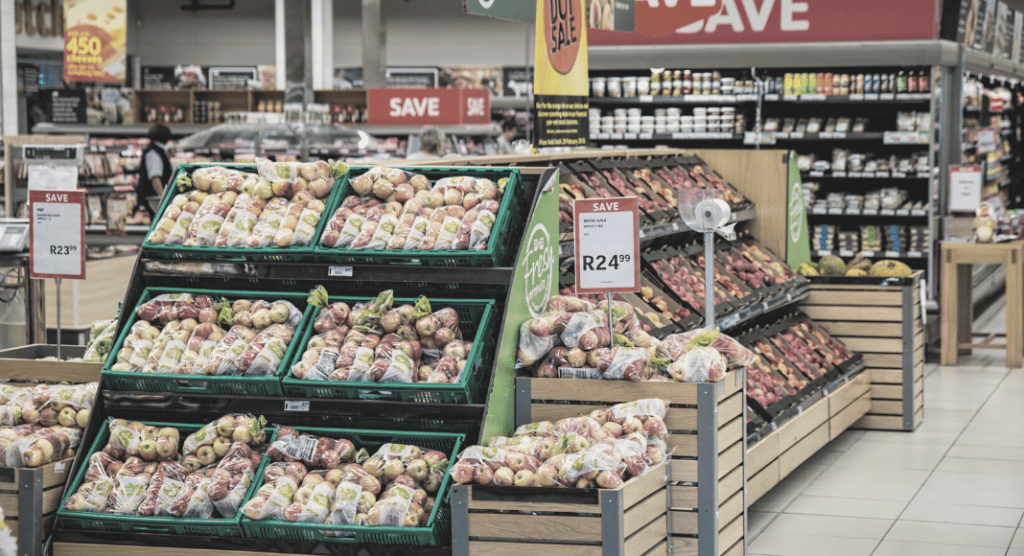 One of the biggest changes for our family since I became a stay-at-home mom is the obvious decrease in income. For the first seven years of our marriage, I was a full-time public school teacher…so obviously, we were extremely wealthy. (Hopefully, you read that with all of the sarcasm I intended.) But we were comfortable and didn’t have to worry too much about money; however, in 2020, we decided I would quit my job to be a stay-at-home mom with the birth of our second child.
One of the biggest changes for our family since I became a stay-at-home mom is the obvious decrease in income. For the first seven years of our marriage, I was a full-time public school teacher…so obviously, we were extremely wealthy. (Hopefully, you read that with all of the sarcasm I intended.) But we were comfortable and didn’t have to worry too much about money; however, in 2020, we decided I would quit my job to be a stay-at-home mom with the birth of our second child.
Since then, we have had to pay closer attention to our funds. I have had to learn, within the past two years, how to become more frugal and resourceful with what we have.
As I’m sure you’re aware, we’re seeing price increases like never before in most of our lifetimes. Many items are running out stock or are just too expensive for one-income families. Gas prices are on the rise. Many families are struggling to be able to find or afford the things that they need. This can cause a lot of stress and anxiety for families with one income or families in general, to be honest.
For these reasons, I have been finding ways to become a better spender of my family’s money in order to make sure we have what we need:
Tip #1: Planning
One of my biggest tips — and things I struggle with the most — is PLANNING! I know this sounds a little out of place for a post about saving money and frugality, but I’ve noticed this to be the biggest contributor of our money spending habits. The biggest thing to plan is a budget, obviously. We have been using the monthly income tracker from The Budget Mom in combination with some Dave Ramsey practices. Basically, every single dollar we earn is designated. In addition to that, we use cash for everything that isn’t an automatic withdrawal. There’s just something about the physical process of giving a dollar away that turns me into the most avid saver in the world…but if it’s digital, it’s essentially Monopoly money in my mind. Whatever your preference, plan where your money is going.
Another huge game changer with our frugality has been meal planning. I highly recommend planning out your meals using whatever you already have in your pantry or fridge. We have also turned this into a game of how many weeks can I plan at a time without having to go to the store. So far, I’ve made it two weeks. That’s a pretty big accomplishment for a couple that used to spend $800 a month on eating out, before children, of course. Through meal planning and using what we already have, I have been able to decrease our grocery budget by almost $100 a month. When you’re on a limited income and facing rising food costs, that’s a huge deal! Turn it into a game. Find a friend to compete with and with whom you can share meal plans. Have a girls’ night making freezer meals. Make it fun. Do whatever you need to do to ensure that you are prepared to make it off of what you plan for meals.
Tip #2: Be Honest
This is something that, again, probably seems out of place. This is also something that I think will be a struggle for a lot of people. For some reason, adults like to pretend that money grows on trees and that being on a budget or being frugal is a shameful thing — IT’S NOT! Ensuring that your family is fed and provided for is something to be proud of, so let’s stop being ashamed of that.
When holidays, birthdays, and other events happen, do NOT feel obligated to buy a big, expensive gift. Most of the time, the buyer puts more importance on the gift than the person receiving the gift. Be honest with whomever is involved in the situation; it’s ok to be on a budget and not be able to purchase something extravagant. Brainstorm other options for gifts. For kids, give YOUR child a $10-$20 limit at the Dollar Tree and make a gift bag of fun toys. Instead of spending money, spend quality time with people. Make a fun day out of it. Try making homemade goodies for friends and family. Get creative…but we have to stop feeling like we are obligated to dip into our family’s budget in order to please other people.
Another way I’ve had to learn to be more honest is making plans with others. Whenever someone invites me out somewhere, whether it’s to go out to eat, get a manicure, go shopping, or whatever, I feel like I HAVE to say yes. I get major FOMO. But this isn’t helping me or my family in our journey to being more frugal and responsible with our money. I’m having to learn to say no more often. I’m learning to be honest with people and explain that it may not be in the budget to spend time going out and about, but I still want to spend time with them. Some things I’ve tried is inviting friends to my house for a game night. Meeting up at a park for a picnic and hang out while the kids play. Finding something free to do with others so that I am still spending time with people that are important to me without making my family sacrifice money.
Tip #3: Spend Smartly
As someone who shops for comfort, moving to one income was a struggle. I really made some mistakes at first spending money without thinking about where the money was coming from. (Late night Amazon shopping while nursing a newborn, anyone!?) I’ve had to really change my habits when it comes to spending, and I’m still working on it, but I have learned some tricks in the past year that have helped significantly.
The buy one for now and two for later trick is my favorite way to bulk up my family’s food supply. As you begin meal planning more, you will pay more attention the cost of things and noticing the highest and lowest price for different items. When things go on sale or reach a low price, it’s a good time to bulk up. Last week, cheese was buy one get one free at our local grocery store. I bought 15 bags. Of course, my family won’t eat 15 bags of cheese in two weeks, but I was able to freeze 12 of them for later in case we run low or can’t afford to buy them at a later date. This also help us all avoid the terrible situation of going to a store to see that things have been ransacked because people panic purchased and now the world is out of toilet paper. Cue the horrible flashback to 2020!
Another shopping habit we have adopted is shopping secondhand for things. Obviously we don’t shop secondhand for everything, but I have made it a habit to check thrift stores, Facebook Marketplace, and yard sales for items before purchasing them new. Many times, you can find things in great condition for a fraction of the price just by buying them used. This year, we have found the secret gem of bargain grocery stores. These are stores that sell items heavily discounted because they are dented or the packaging is defected; however, the food itself is perfectly good. While these stores aren’t technically secondhand, they are passed from a grocery store to another store, so the price is decreased dramatically.
One rule that I have imposed on our family for bigger purchases is not spending money out of our pockets for items that aren’t necessities. Instead, we sell something that we don’t use in order to save the money for the new things. For example, I wanted some home decor at the beginning of this year. I began going through my clothes and other decor pieces that I no longer used and posted them on Facebook Marketplace. I used the money that I made from that to purchase the new decor. This helps me to make sure I’m not dipping into our family’s funds for things we actually need. It also helps me spend time waiting to purchase things to make sure it’s something I actually want. I can usually judge if it’s something I will really like if it’s worth the wait and losing other items.
Tip #4: Learn New Skills
This past year, our family moved from the city out to the country and started a small hobby farm. Since entering in the homesteading scene, we’ve learned that having skills is extremely valuable and essential for providing for your family on a small budget. Things like learning to sew or repair things can be extremely valuable for your family. When you possess skills like these or others, you can use them to barter for items or services if you are running low on money.
One thing I’ve been learning to do this year is cook from scratch. Having the skill to make your own bread when prepackaged bread is too expensive is so empowering. Also, when you learn to cook from scratch, you make better use of the ingredients you have on hand. I’m also learning about “instinctual cooking” or cooking based off of what you feel would be a great combination instead of following a recipe. Again, when you’re developing these skills, you are more likely to use your ingredients all of the way instead of wasting or buying more items just because a recipe calls for it.
Another thing we are learning this year is gardening. Trust me, we’re a long way from being able to grow all of the produce our family consumes, but every item we grow is one less thing we’re buying at the store. It’s also a really fun and educational experience for our children, too! You don’t have to live on a farm or have tons of property to start gardening. You don’t have to have tons of knowledge. Just pick 1-3 items that your family eats frequently, do some research, and start slowly.
























